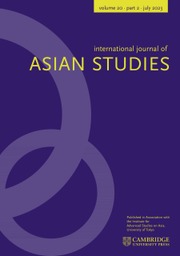No CrossRef data available.
Article contents
CHRISTIANITY AND THE OTHER: FRIEDRICH SCHLEGEL'S AND F. W. J. SCHELLING'S INTERPRETATION OF CHINA
Published online by Cambridge University Press: 30 June 2005
Abstract
Every culture is self-centred and distinguishes itself from others which are inadvertently positioned off-centre. Thus ancient Greece called the non-Greeks barbarians, and the ancient Chinese called their own country the Celestial Empire and considered those who did not practise their culture as barbaric. In the modern age, Europe distinguished itself from the non-West principally by two features: Christianity and capitalism. Generally, it is considered that Christianity produced capitalism (Max Weber), so that the former can really be considered the foundation of Western Culture. In my paper, I demonstrate that Christianity is used to measure and construct non-European peoples and cultures within the western perception of the philosophy of history. Christianity is given supreme value, and related religions are considered to be corrupted in varying degrees, with non-theistic cultures bringing up the very rear.
- Type
- INDEPENDENT PAPERS
- Information
- Copyright
- © Cambridge University Press 2005


